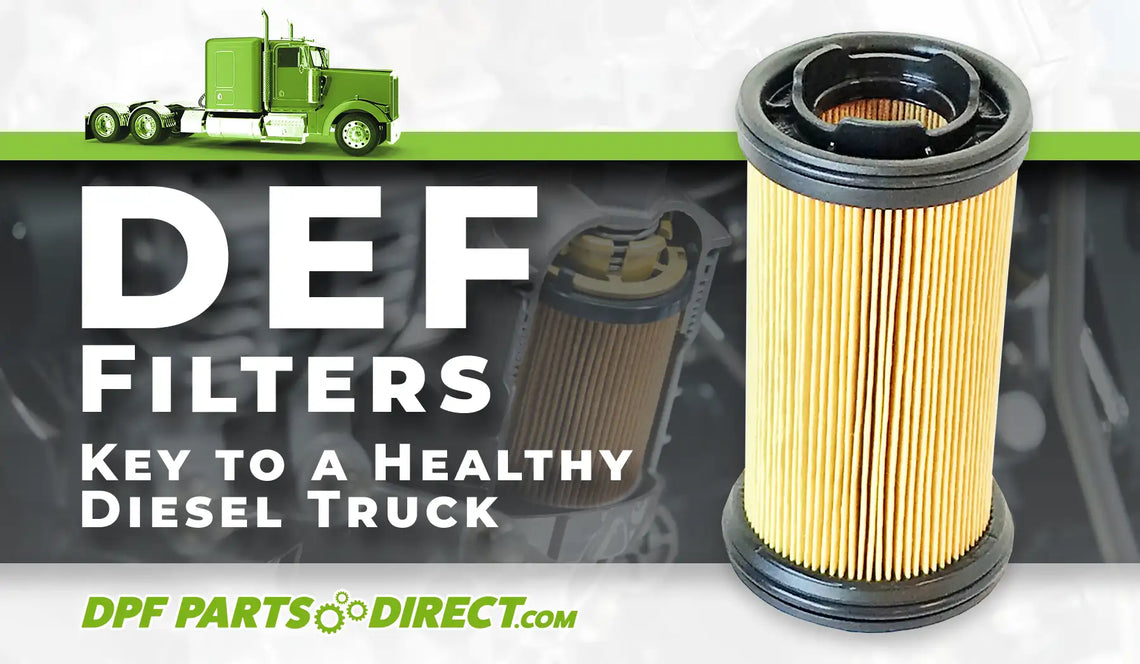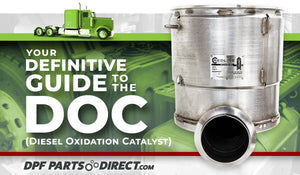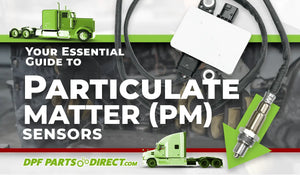A well-functioning DEF filter is a crucial aspect of maintaining a diesel truck's aftertreatment system to ensure that it runs well mile after mile. At DPF Parts Direct, we specialize in providing high-quality parts for diesel trucks, and one critical aspect of maintaining a healthy diesel truck is keeping its aftertreatment system components operating efficiently.
This article emphasizes the significance of the DEF filter and its role in the operation of a effective aftertreatment system which in turn means healthier and more fuel efficient diesel trucks. Properly maintaining this relatively small part can save your operation big bucks.
What Is DEF?
DEF (diesel exhaust fluid) is a crucial part of the aftertreatment system for diesel trucks, as it helps to reduce harmful emissions and improve air quality. When DEF is injected into the exhaust system, it reacts with the NOx emissions and converts them into harmless nitrogen and water vapor. This process is known as selective catalytic reduction (SCR), and it is one of the most effective ways to reduce the NOx portion of diesel engine emissions.
The use of DEF is becoming increasingly important due to the strict emissions regulations set by the Environmental Protection Agency (EPA) in the United States and other regulatory bodies around the world. Many new diesel trucks are equipped with DEF systems, and older trucks are being retrofitted with SCR technology to meet these regulations.
To ensure that the DEF system operates effectively, it is crucial to use high-quality DEF and maintain the system regularly. This includes monitoring the DEF tank level and replacing the DEF filter when necessary or as recommended by the manufacturer. Regular maintenance and proper handling of DEF can help prevent filter clogs, ensure that the system operates efficiently, and extend the life of the aftertreatment system components.
The Role of DEF Filters
DEF filters are typically made of a porous material that allows DEF fluid to pass through while capturing any contaminants that are present. These contaminants can include dirt, dust, and other small particles that can accumulate in the DEF tank or be introduced during the refilling process.
Over time, DEF filters can become clogged with these contaminants, which can cause a variety of issues for the aftertreatment system. A clogged filter can lead to reduced DEF flow, decreased system efficiency, and even engine performance problems. In extreme cases, a clogged filter can cause damage to other components of the aftertreatment system, such as the SCR catalyst.
To prevent these issues, it is important to regularly check the condition of the DEF filter and replace it, as necessary. Some of the common signs of a clogged DEF filter include a decrease in fuel economy, the illumination of a DPF warning light on the dashboard, and poor engine performance. Regular filter maintenance can help ensure that the aftertreatment system operates efficiently and effectively.
It is also important to use high-quality DEF and store it properly to prevent contamination. DEF should be stored in a dedicated tank, away from sources of heat and direct sunlight, and should be handled with care to avoid spills and leaks. By taking these steps, diesel truck owners can help ensure that their DEF filters will operate reliably and effectively over the long term.
Common Reasons for DEF Filter Clogs
Crystallization of DEF is one of the most common reasons for DEF filter clogs. This occurs when the DEF solution is exposed to extreme temperatures, causing the water to evaporate, and leaving behind solid urea crystals. These crystals can then accumulate in the filter and obstruct the flow of DEF fluid. Crystallization can also occur due to poor-quality DEF or DEF that has exceeded its shelf life.
Contamination from other fluids or materials can also contribute to DEF filter clogs. For example, if diesel fuel or engine oil enters the DEF tank, it can cause the DEF to break down and form solids that can clog the filter. Other contaminants, such as dirt or debris, can also accumulate in the DEF tank or during the refilling process, leading to clogs.
Improper handling or storage of DEF can also contribute to filter clogs. DEF should be stored in a clean, dry, and well-ventilated area away from direct sunlight and sources of heat. If DEF is not handled properly, it can become contaminated with dirt, debris, or other materials that can clog the filter.
A clogged DEF filter can have grave consequences for diesel trucks. If the filter becomes completely blocked, it can cause the system to malfunction, leading to poor engine performance, increased emissions, and even engine shutdown. To avoid these issues, it is essential to monitor the condition of the DEF filter and replace it as necessary.
Regular maintenance and proper handling of DEF can help prevent filter clogs and ensure that the aftertreatment system operates effectively and efficiently.
Where to Purchase DEF Filters & Aftertreatment Parts

At DPFPartsDirect.com, we not only recognize the importance of clean aftertreatment systems, but we also offer a range of products to ensure that your diesel truck runs efficiently and meets emissions standards. Our DEF filters are just one example of the quality products we offer.
Additionally, our diesel particulate filters (DPF filters), diesel oxidation catalysts (DOCs), and selective catalytic reduction (SCRs) aftertreatment components are designed to keep your truck running smoothly while reducing harmful emissions. We use high-quality materials to manufacture our products, and they are designed to meet or exceed OEM specifications.
Our goal is to help our customers maintain their aftertreatment systems effectively and efficiently. This includes providing quality parts and DPF Cleaning equipment.
DEF Filters Are Vital to Your Aftertreatment System
DEF filters are vital to maintaining a healthy aftertreatment system in diesel engines. Also, regular DPF cleaning and maintenance can help prevent clogs and ensure that the system operates effectively in reducing emissions.
At DPF Parts Direct, we offer a wide range of DEF filters and other aftertreatment parts to help you maintain your diesel truck's aftertreatment system. Request a Quote to get bulk pricing on higher quantities of DEF filters or visit our website to purchase replacement DEF filters and many other diesel emissions parts.










Comments 0